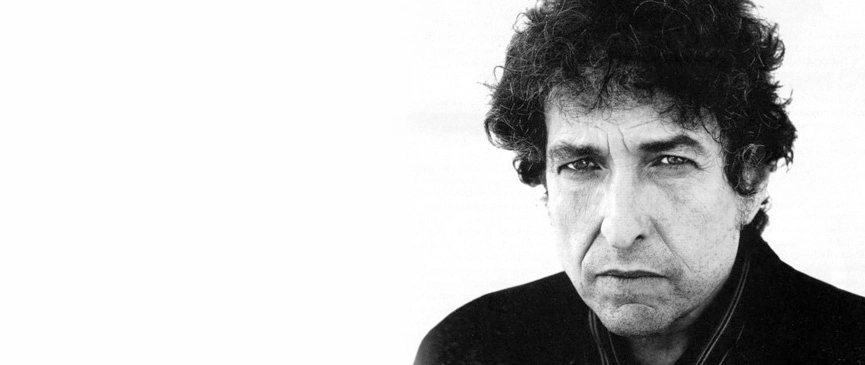Main content
Bob Dylan Prince of Asturias Award for the Arts 2007

Robert Allen Zimmerman, known as Bob Dylan (Duluth, Minnesota, USA, 1941), Nobel Prize in Literature 2016, a pioneer in bridging literature and popular music, he fused European and African-American rhythms for the first time, originating a revolution of a decisive influence for subsequent generations of musicians.
He began to play the guitar as a teenager and it was during his stay at Minnesota University and his involvement in the folk scene that he decided to move to New York and devote himself completely to music. He released his first album, Bob Dylan, in 1961, which sold two million copies. His second album included Blowin’ in the Wind, which became an anthem of the anti-war and civil rights movements in the United States. In 1964, The Times They Are A-Changin’ marked an end to his period as a protest-song performer. In 1965, Highway 61 Revisited, which includes the song Like a Rolling Stone, changed the conception people had of rock & roll at that time due to the depth of its poetic lyrics. He then appeared at the Newport Folk Festival with these songs accompanied by the group The Band, with which he performed until 1976, the year they performed a farewell concert called “The Last Waltz”, chronicled and made into a documentary by Martin Scorsese. He reappeared in 1968 with the album John Wesley Harding after having suffered a motorcycle accident in 1966. In 1973, he composed the soundtrack for Sam Peckinpah’s film Pat Garrett & Billy the Kid, in which he also played a minor role. Two years later he filmed the only movie he has directed, Renaldo and Clara, although he has participated in several films and his songs are featured in numerous soundtracks. He also co-wrote Charles Larry’s film, Masked and Anonymous (2003), directed by Larry Charles. During the eighties, he recorded several albums centred on his new religious interests and, for a while, formed part of the band The Traveling Wilburys. In 1997, he performed in Bologna (Italy) before His Holiness Pope John Paul II. A staunch advocate of social causes, he has lent his support to numerous solidarity initiatives, including Farm Aid and Live Aid, a fundraiser for famine-relief in Ethiopia. In 2006, he performed at a beach in San Sebastian (Basque Country, Spain) before 100 000 people in what was billed as a “Concert for Peace”), a five-album compilation that includes tracks that had not been previously issued. The year 2004 saw the publishing of his autobiography, Chronicles, which had been preceded by several books compiling his writing and lyrics. In 2006, he topped the US charts once again with the album Modern Times and, in 2007, received two Grammys: Best Contemporary Folk Album and Best Solo Rock Vocal Performance for the song Someday Baby. In 2009, he published Christmas in the Heart and, in 2010, The Witmark Demos (1962-1964), the ninth volume of The Bootleg Series, and The Original Mono Recordings, a box containing Dylan’s first seven albums in monaural sound accompanied by a 56-page libretto and an essay by music critic Greil Marcus. In 2011, Columbia released In Concert – Brandeis University 1963, an unpublished concert recorded at the Brandeis Folk Festival in Waltham, Massachusetts, on 10th May 1963, two weeks before the release of The Freewheelin’ Bob Dylan (1963).
In 2011, Dylan participated on the album The Lost Notebooks of Hank Williams, a project comprising unpublished songs of Hank Williams under his own record company, Egyptian Records. Dylan helped complete the project with songs that Williams left unfinished after his death in 1953, which were recorded by musicians such as Levon Helm, Norah Jones, Jack White, Dylan himself and his son Jakob. That same year, Amnesty International presented Chimes of Freedom: The Songs of Bob Dylan Honoring 50 Years of Amnesty International, a compilation of 76 cover versions of Dylan’s songs performed by a long list of musicians including Pete Townshend, Kronos Quartet, Sinead O’Connor and Pete Seeger. In 2012, Dylan released Tempest, a new studio album with a sharp turn towards dark, violent lyrics that includes references to the sinking of RMS Titanic in the song Tempest and a tribute to John Lennon in Roll On John. In 2014, Dylan released a version of Full Moon and Empty Arms, a song made popular by Frank Sinatra in 1945. The song served as a preview for “a future album scheduled to be released later this year”, a spokesman stated, with the possible title of Shadows in the Night (2015). In addition, in November of the same year, Columbia released The Basement Tapes Complete, a box of six discs with 138 songs recorded with The Band at his home of Woodstock (Ulster, New York) in 1967.
Throughout his career, Bob Dylan has won ten Grammy Awards, besides receiving the Grammy Lifetime Achievement Award in 1991. He was made Commander of the French Order of the Arts and Letters and, in 1997, received the Kennedy Center Honors for a lifetime of artistic work. In 2000, he received the Polar Music Prize from the King of Sweden, an award granted by the Royal Swedish Academy of Music. In 2001, he won an Oscar for Best Original Song and a Golden Globe for his song Things Have Changed, which was featured in the film The Wonder Boys. He holds an honorary doctorate from Princeton University and was listed as one of Time Magazine’s 100 most influential people of the 20th century. He has sold more than 90 million records over the half-century span of his career. In 2008, he received a Pulitzer Prize special citation for his “profound impact on popular music and American culture, marked by lyrical compositions of extraordinary poetic power”. He received the Barack Obama Presidential Medal of Freedom in 2005 and the Nobel Prize in Literature in 2016.
End of main content
